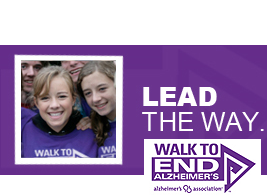
Learn More About Alzheimer's Disease and Alzheimer's Care in Wheat Ridge, CO

What is Alzheimer’s disease? What are the symptoms of Alzheimer’s? What are my loved one’s best options for Alzheimer’s care?
If you have a loved one who has recently been diagnosed with Alzheimer’s disease, you likely have many questions about your loved one’s condition. This FAQ gives you answers from the Alzheimer’s care professionals at Visiting Angels®.
On this page, you’ll find answers to frequently asked questions about Alzheimer’s, including topics like “What is Alzheimer’s?”, “How does Alzheimer’s disease progress?”, and “What’s the difference between Alzheimer’s and dementia?”.
What is Alzheimer’s disease?
The most frequently asked question about Alzheimer’s disease is also the most basic: “What is Alzheimer’s disease?”
Alzheimer’s disease is a degenerative brain disorder that is characterized by memory loss, cognitive decline, and behavioral changes. Alzheimer’s is a progressive, degenerative disease. Symptoms worsen over time, usually over the course of several years. Roughly 5.5 million Americans are living with Alzheimer’s, the vast majority of whom are over the age of 65.
Alzheimer’s is considered a terminal condition, with an average life expectancy of 4 to 8 years after diagnosis, though some individuals live 15 or 20 years after their initial diagnosis. It is the sixth leading cause of death in the US.
What is the difference between Alzheimer's and dementia?
Dementia is an umbrella term for a wide range of brain disorders that are characterized by memory loss. Alzheimer’s is the most common form of dementia. According to estimates, Alzheimer’s cases account for somewhere between 60% to 80% of all cases of dementia.
It’s therefore true that everyone with Alzheimer’s has dementia, but not everyone with dementia has Alzheimer’s. Individuals who are living with vascular dementia, for instance, will suffer symptoms similar to Alzheimer’s, but the cause of their dementia is different from someone with Alzheimer’s.
What are the risk factors for Alzheimer’s?
Alzheimer’s has a number of risk factors. While scientists are still researching the exact cause of Alzheimer’s disease, researchers have identified a number of risk factors.
The three biggest risk factors for Alzheimer’s are as follows:
- Advanced Age. In the vast majority of cases, symptoms of Alzheimer’s disease begin after the age of 65.
- Genetics. Individuals with a family history of Alzheimer’s disease are at higher risk of developing Alzheimer’s themselves.
- Heart Health. Poor cardiovascular health increases one’s risk of developing Alzheimer’s disease. Individuals with a history of hypertension, high cholesterol, diabetes, stroke, or cardiac arrest will be at higher risk of developing Alzheimer’s disease.
Other risk factors include: sleeping problems, high stress levels, heavy smoking, heavy drinking, a history of head trauma, exposure to air pollution, and others.
What are the symptoms of Alzheimer’s?
Alzheimer’s disease has a wide range of symptoms. Most symptoms of Alzheimer’s, particularly early on, are expressed through a person’s speech, thought patterns, and behaviors.
The most prominent symptoms of Alzheimer’s include:
- Short-term and long-term memory loss
- Trouble solving simple problems
- Uncommon struggles with day-to-day activities
- Forgets words or begins mixing up words
- Loses items or becomes lost more frequently
- Becomes confused about current time or place
- Confuses the names and identities of people
- Acts more irrationally, irritably, or depressed than usual
How does Alzheimer’s disease progress?
Researchers believe that Alzheimer’s disease begins many years before people with the disease begin to show symptoms. Symptoms typically start to appear in old age, though some cases of Alzheimer’s begin in a person’s 40’s or 50’s. Alzheimer’s is a gradual, progressive disease, with symptoms becoming worse over a period of years.
At first, symptoms will be mild and will have minimal impact on the person’s well-being. As the disease progresses, symptoms develop from mild to moderate to severe. By the final stages of the disease, the person may lose all short-term and long-term memory, the ability to speak and to understand speech, and the ability to perform basic personal activities, such as how to use the bathroom or eat on their own.
Does Alzheimer’s disease have a cure?
Currently, there is no known cure for Alzheimer’s disease, and the disease’s progress is believed to be irreversible. While scientists continue to search for a cure, modern treatments for Alzheimer’s are limited to those that may prevent the disease, delay its initial symptoms, or slow its progress.
Doctors recommend that individuals at risk or living with Alzheimer’s disease focus on healthy lifestyle choices, with a particular focus on cardiovascular health. Interventions such as improved sleep habits, increased omega-3 intake, and decreased stress are also proven to reduce the risk of Alzheimer’s.
What are my loved one’s options for Alzheimer’s care?
As Alzheimer’s disease progresses, individuals living with the disease tend to require high levels of care to ensure their well-being and safety. Individuals with early-stage and mid-stage Alzheimer’s are typically cared for by friends or family. But as Alzheimer’s disease reaches its later stages, professional Alzheimer’s care is often required.
One option for Alzheimer’s care is moving your loved one into a nursing care facility. However, this can be traumatic for individuals with Alzheimer’s, and it is typically considered a last resort.
Another option is to hire Alzheimer’s home care services, such as those offered by your local Visiting Angels. What is Alzheimer’s home care? This specialized type of in-home care is designed to help individuals age in place with Alzheimer’s disease.
Alzheimer’s home care is distinct from traditional home care, since individuals with Alzheimer’s have distinct care needs from other seniors. In Alzheimer’s care, the care recipient’s care plan is designed around the unique challenges of Alzheimer’s disease, as well as the care recipient’s individual care needs. Care is provided in the comfort of the care recipient’s home, and services are performed by caregivers who are uniquely qualified to care for individuals living with Alzheimer’s.
Learn more about Alzheimer’s care services offered by Visiting Angels today, or contact your local Visiting Angels office to request a free consultation.
Serving Central Denver, Lakewood, Arvada, Wheat Ridge, Golden & the Surrounding Areas
Visiting Angels DENVER, CO
4251 Kipling St #535Wheat Ridge, CO 80033
Phone: 303-232-9999
